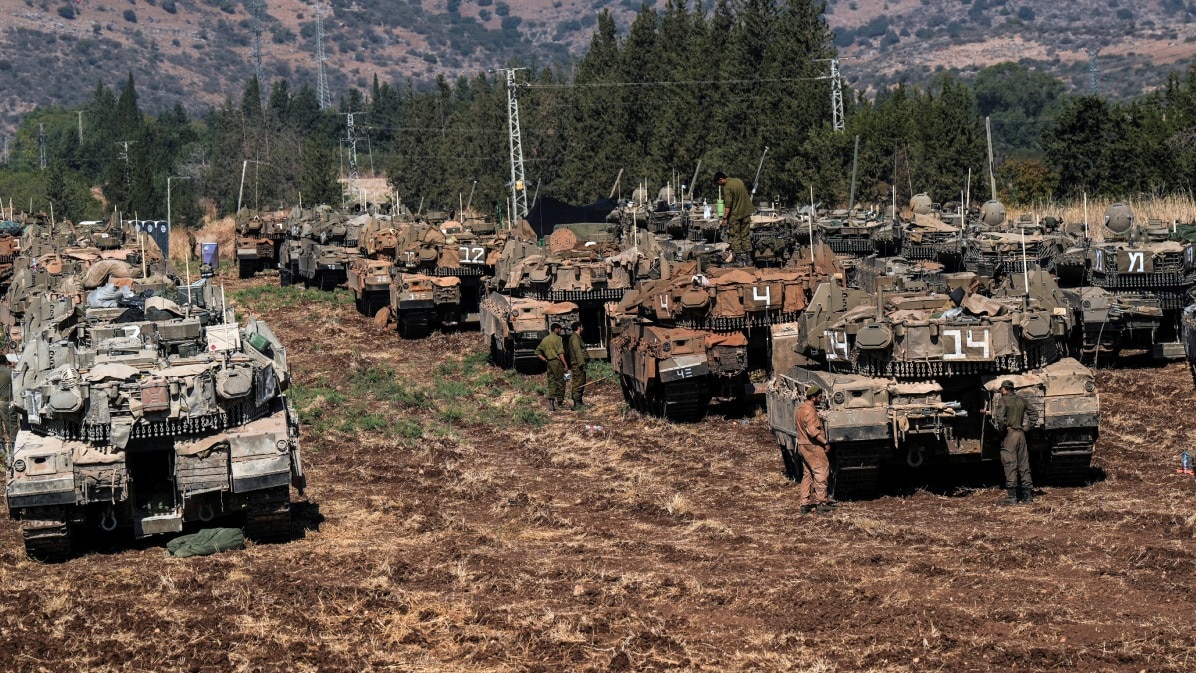2024-09-27 12:57:20
The Israeli Army has deployed additional tanks and armoured vehicles along its northern border with Lebanon, signalling imminent preparations for a ground invasion. This follows Israel’s directive to its military to be ready for a possible incursion into Lebanon, as it steps up its offensive against the Iran-backed militant group Hezbollah.
Top Israeli officials have warned that Lebanon could face the same fate as Gaza if Hezbollah continues its rocket attacks. Israeli Defence Minister Yoav Gallant, speaking to soldiers, stated, “We are striking Hezbollah from the air and sea… and you must prepare for a ground assault”.
Israel and Hezbollah have been engaged in open conflict since the explosions of pagers and walkie-talkies on September 17 and 18, which were allegedly orchestrated by Israel. Since then, over 700 people, including women and children, have been killed in a week in Lebanon.
-
Israeli forces continued heavy aerial bombardments in Lebanon on Friday, raising fears of a Gaza-like scenario with widespread displacement and destruction. At least 25 people were killed and dozens injured in today’s attacks. Over the past 72 hours, more than 30,000 people, primarily Syrians, have fled from Lebanon into Syria, according to a UN agency.
-
Israeli military vehicles were spotted transporting tanks and armoured vehicles toward the northern border with Lebanon, as commanders issued a call-up for reserve forces, according to news agency AP. The army has also continued warning residents to evacuate homes it claims are near Hezbollah ammunition storage sites.
-
Israeli Prime Minister Benjamin Netanyahu vowed to launch “full force” strikes against Hezbollah until the group ceases its rocket attacks across the border. Israel’s “policy is clear,” Netanyahu said. “We are continuing to strike Hezbollah with full force. And we will not stop until we achieve all our goals, chief among them the return of the residents of the north securely to their homes”.
-
Meanwhile, Yemen’s Iran-aligned Houthis targeted Israel’s cities of Tel Aviv and Ashkelon on Friday with a ballistic missile and a drone. In a televised speech, the group’s leader Yahya Sarea said, “We will carry out more military operations against the Israeli enemy in victory for the blood of our brothers in Palestine and Lebanon”.
-
The United States, France, and other allies have jointly called for a 21-day ceasefire between Israel and Hezbollah. Although Prime Minister Netanyahu initially rejected these peace efforts, he indicated on Friday that the country will continue to press on ceasefire discussions, while emphasising the need to continue targeting the Iran-backed militant group. “Our teams met to discuss the U.S. initiative and how we can advance the shared goal of returning people safely to their homes. We will continue those discussions in the coming days,” he said in a statement.
-
US Secretary of State Antony Blinken, after his talks with Israeli Minister for Strategic Affairs Ron Dermer, said any further escalation would only make it harder for civilians to return home on both sides of the border. “The Secretary discussed the importance of reaching an agreement on the 21 day ceasefire across the Israel-Lebanon border,” the State Department said. “He underscored that further escalation of the conflict will only make that objective (of civilian return) more difficult,” Blinken added.
Israeli forces continued heavy aerial bombardments in Lebanon on Friday, raising fears of a Gaza-like scenario with widespread displacement and destruction. At least 25 people were killed and dozens injured in today’s attacks. Over the past 72 hours, more than 30,000 people, primarily Syrians, have fled from Lebanon into Syria, according to a UN agency.
Israeli military vehicles were spotted transporting tanks and armoured vehicles toward the northern border with Lebanon, as commanders issued a call-up for reserve forces, according to news agency AP. The army has also continued warning residents to evacuate homes it claims are near Hezbollah ammunition storage sites.
Israeli Prime Minister Benjamin Netanyahu vowed to launch “full force” strikes against Hezbollah until the group ceases its rocket attacks across the border. Israel’s “policy is clear,” Netanyahu said. “We are continuing to strike Hezbollah with full force. And we will not stop until we achieve all our goals, chief among them the return of the residents of the north securely to their homes”.
Meanwhile, Yemen’s Iran-aligned Houthis targeted Israel’s cities of Tel Aviv and Ashkelon on Friday with a ballistic missile and a drone. In a televised speech, the group’s leader Yahya Sarea said, “We will carry out more military operations against the Israeli enemy in victory for the blood of our brothers in Palestine and Lebanon”.
The United States, France, and other allies have jointly called for a 21-day ceasefire between Israel and Hezbollah. Although Prime Minister Netanyahu initially rejected these peace efforts, he indicated on Friday that the country will continue to press on ceasefire discussions, while emphasising the need to continue targeting the Iran-backed militant group. “Our teams met to discuss the U.S. initiative and how we can advance the shared goal of returning people safely to their homes. We will continue those discussions in the coming days,” he said in a statement.
US Secretary of State Antony Blinken, after his talks with Israeli Minister for Strategic Affairs Ron Dermer, said any further escalation would only make it harder for civilians to return home on both sides of the border. “The Secretary discussed the importance of reaching an agreement on the 21 day ceasefire across the Israel-Lebanon border,” the State Department said. “He underscored that further escalation of the conflict will only make that objective (of civilian return) more difficult,” Blinken added.
8 total views , 1 views today
